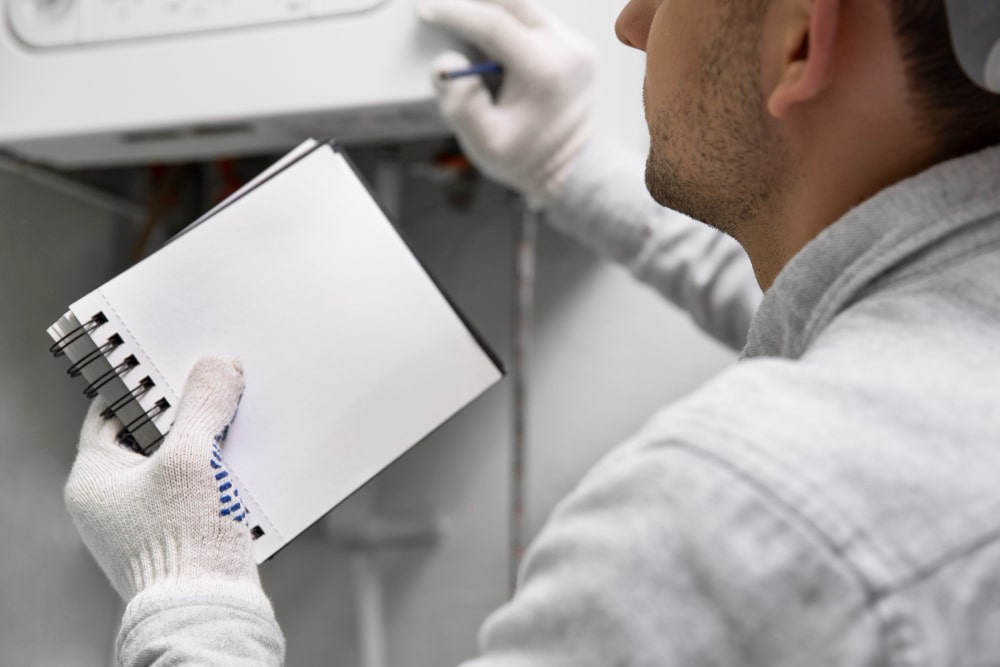Multi-Award Winning Commercial Plumber in Perth
or call 08 9258 8848
We are Perth's
Go-To Commercial
Plumbers
At Rowson’s Plumbing Services, we believe in honesty and integrity above all else. We don’t want to just fix your problems; we want to help you prevent them from happening again. That way, you can save money while also saving time and hassle. Our team of highly trained plumbers are ready to help with any job, big or small! Call us today at (08) 9258 8848 for a free quote on our services!
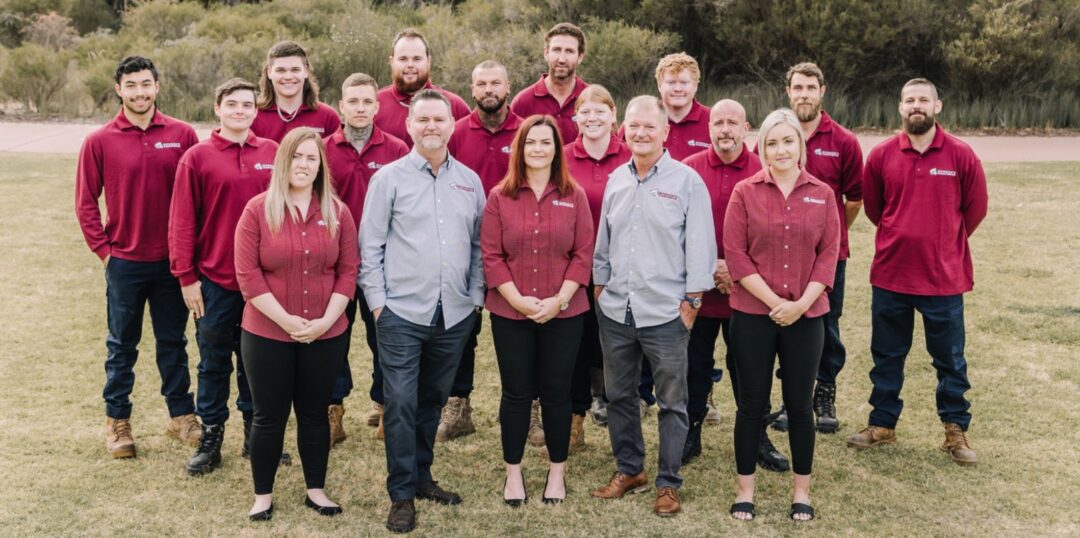



100%
Satisfaction Guarantee
Plumbing
Year
Commercial
Plumbing
Year
Maintenance
Plumbing
Year
Customer
Service
Award
Health & Safety
Excellence
Year
Employer of
the Year


Our Services

Blocked Drains
If you’re experiencing any issues with your drains, pipes or toilets, don’t worry. We can help! Rowson’s Plumbing Services are available 24 hours a day, seven days a week for all of the plumbing needs of your home or commercial property.

Gas Plumbing
Rowson’s Plumbing Services offers comprehensive gas plumbing services to ensure that your home is safe from any potential dangers. We will come out to your house and inspect all of the pipes for leaks so that you can rest easy knowing that everything is secure!

Hot Water Systems
Do you have a hot water system? Do you know what to do if it breaks down? If your hot water system is on the fritz, we can help. Rowson’s Plumbing Services has been servicing customers in Perth for over two decades and has become one of the most trusted names in plumbing services.

Commercial Plumbing
Rowson’s Plumbing Services is a multi-award winning commercial plumbing company that has been providing high quality services to Perth businesses for over 20 years. We are proud of our reputation as one of the most trusted commercial plumbers in Perth, and we never stop working until your problem is resolved.

General Plumbing
Our team of licensed plumbers are experts at solving any issue that might arise with your entire plumbing system. We offer a wide range of plumbing services, from drain cleaning to water heaters and everything in between!

Pumps
Rowson’s Plumbing Services is your one-stop solution for all your water pump needs. We offer a wide range of services that cover the installation, repair, and maintenance of pumps.
Professional Commercial & Residential Perth Plumbers
Book An Appointment Today
Perth’s Best Commercial Plumber
Established in 1998, Neil Rowson’s vision was to build a highly professional team of tradespeople with a focus on customer service and is very proud to be awarded the 2015 Inaugural Customer Service Award, 2017 Plumbing Business Of The Year, 2017 Employer Of The Year, 2017 Health and Safety Excellence Business of The Year from the Master Plumbers and Gas Fitters Association of WA.
Our commitment to customer service standards are expected from our team including management, trades, administration, and support. Every client is expected to be treated with the utmost respect and the highest standard of workmanship at all times.
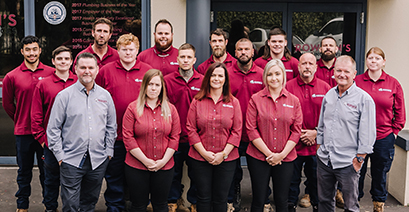
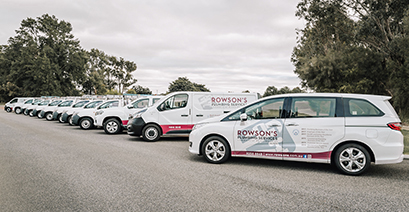
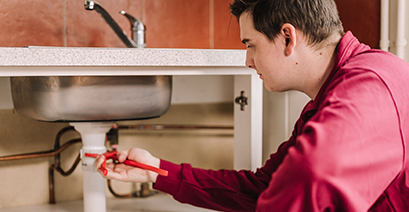
Why Perth Resident’s Choose Rowson’s
Our expert plumbers in Perth are thoroughly trained to assess the situation and effectively respond in a way that treats the source of the problems. We use advanced plumbing technology, drain cleaning and video plumbing inspection to help us make sure you are getting the most efficient, accurate, and excellent and affordable plumbing services.This company’s commitment toward providing high standards for each individual task means there are no half measures when it comes down to how things will be done.
You can trust our team with your home or business because we treat every job like it’s our own! We offer 24/7 emergency services so you can get back on track as soon as possible! Don’t wait another minute; call Rowson’s Plumbing Services today!


Our Vision & Mission at Rowson’s Plumbing Services
Our commitment to customer service standards are expected from our team including management, trades, administration, and support. Every client is expected to be treated with the utmost respect and the highest standard of workmanship at all times.
When you choose Rowson’s Plumbing Services for all your plumbing needs, you can expect nothing but the best from our team. From start to finish, we will be there every step of the way until your project is completed successfully. We want you as a client for life! Call today for an estimate or schedule an appointment online!


Family Owned & Operated For Over Two Decades
Available
24/7
Prompt Arrivals & Fast Turnarounds

Rest Easy By Choosing Our Professional
Commercial & Residential Perth Plumbers
Book An Appointment Today
or call 08 9258 8848
From the Blog
Does an old hot water use more electricity?
It’s a question that homeowners have asked for years—does an old hot water system use more electricity? The answer, unfortunately, is not straightforward. While there are some factors to consider when it comes to how much power your hot water unit consumes, there is no definitive answer.
How Much Does the Hot Water Heater Affect the Electric Bill?
The size, age, and efficiency of your water heater all play a role in how much it will affect your electric bill. A tank model is typically more expensive to operate than an on-demand model, and a larger unit will use more electricity than a smaller one. The temperature you set your water heater to also makes a difference; the higher the setting, the more electricity it will use. Finally, how much hot water you use in a day will also affect your energy bill. If you have a large family or frequently use hot water for laundry, dishes, and hot showers, you can expect to see a higher electric bill than someone who doesn’t use as much hot water.
Electricity Consumption
An electric storage tank water heater and an electric continuous flow water heater operate differently, and as a result, they differ in their electricity consumption. An electric tank water heater stores hot water in a tank and then uses electricity to keep the water hot even when it is not needed. In contrast, an electric continuous flow water heater only heats water when it is being used. As a result, the continuous flow system is much more energy efficient. In addition, the tankless system does not suffer from standby loss, which can account for up to 15% of the energy used by a conventional storage-tank water heater. Consequently, an electric continuous flow water heater is the best option if you want to reduce your electricity consumption.
Calculating Energy Usage
To calculate the cost of running your water heater, you will need to know the wattage of your heater and the price you pay per kilowatt-hour (kWh) of electricity. You will also need to know how many hours the heater is active per day. Multiply the wattage by the price per kWh, then multiply that number by the number of hours per day the heater is active. Finally, divide that number by 1,000. This will give you an estimate of the cost of running your water heater. Keep in mind that this is just an estimate, as actual costs may vary depending on a number of factors. However, this should give you a good starting point for understanding the cost of operating your water heater.
Reducing Water Heater Electricity Usage
Water heaters can be a significant source of energy consumption, accounting for up to 20% of a home’s total electricity usage. There are several ways to reduce the amount of electricity your water heater uses. One is to simply turn down the thermostat. Lowering the setting can save significant amounts of energy. Another way to reduce electricity usage is to take shorter showers. Water heaters have to work hard to maintain a high water temperature, so cutting back on shower time can make a big difference. You can also install low-flow taps and shower heads, which use less hot water without sacrificing comfort. By taking these simple steps, you can significantly reduce your water heater’s electricity usage.
Does an old water heater use more electricity?
In general, yes, an old water heater will use more electricity than a newer model. This is because older models are less energy efficient. They have to work harder to heat the water, which means they use more energy. Additionally, older models often have worn-out parts that need to be replaced. This can also lead to increased energy usage. If you’re concerned about your electricity bills, it’s worth considering an upgrade to a newer model water heater. Newer models are much more energy-efficient and can save you money in the long run. But it’s still best to consult a licensed plumber. What you consider old might just need a few maintenance services.
The average lifespan of an electric water heater
There are a number of factors that can affect its lifespans, such as the quality of the unit, the frequency of maintenance, and the hardness of the water. For example, if the water in your area is particularly hard, it can cause deposits to build up on the heating element, shortening its lifespan. In addition, neglecting to flush the unit on a yearly basis can also lead to premature failure. While there’s no guaranteed way to extend the lifespan of an electric water heater, proper maintenance is always a good idea. By taking good care of your unit, you can help ensure that it provides years of reliable service.
The average lifespan of an electric tankless water heater is around 15 years. Tankless water heaters have a longer lifespan than storage tank water heaters because they have no tanks to corrode. Electric models generally last longer than gas models because no flames or combustion occur inside the unit, which can lead to premature deterioration. If you take proper care of your electric tankless water heater, it can last for many years to come. There are a few things you can do to prolong the lifespan of your hot water plumbing, such as descaling it on a regular basis and making sure that the internal components are always clean and free of debris. With proper care and maintenance, your electric tankless water heater will provide you with hot water for many years to come.
Signs your hot water system needs replacement.
As a homeowner, it’s important to be aware of the signs that your hot water system may need to be replaced. An old unit is the most common reason for replacement, as hot water tanks have a typical lifespan of 10–15 years. However, other factors such as leaks, lukewarm water, rust and corrosion, noise from the tank, and frequent repairs can also indicate that it’s time for a new unit. If you’re noticing any of these issues, it’s best to call a professional plumber for an inspection. Rowson’s Plumbing Services provides repair and replacement services for all types and brands of hot water systems. The company also offers a wide range of options for new hot water systems based on the needs of the customer.
Our experienced plumbers can help you determine whether or not your hot water system needs to be replaced and if so, can provide you with an estimate for the replacement. In some cases, repairs may be possible, but if your hot water system is reaching the end of its lifespan, a replacement will likely be the best option. The company’s hot water plumbers are certified and licensed and have the experience and knowledge to provide you with the best possible service.
Are electric water heaters more efficient than gas?
When it comes to water heating, there are a few options available. One of the most popular options is gas, but electric water heaters are becoming more and more common. So, which one is more efficient? Let’s take a closer look.
Types of water heaters
Many types of hot water systems are available on the market, each with its own advantages and disadvantages. The most common type of water heater is the storage tank, which uses electricity or gas to heat water in a tank. Storage tank water heaters are generally less expensive than other types of water heaters, but they have a limited supply of hot water and can be slow to recover after being used.
Tankless water heaters, on the other hand, heat water on demand and do not require a storage tank. These units are more expensive up front, but they offer an endless supply of hot water and can be more energy-efficient in the long run. Finally, solar-powered water heaters use the sun’s energy to heat water, making them an environmentally-friendly option. However, solar water heaters are generally more expensive than other types of water heaters and can only be used in areas with strong sunlight. When choosing a new water heater, it is important to consider your needs and budget to find the perfect option for your home.
Gas vs. Electric Water Heaters
The two most common types of residential water heaters are gas and electric water heaters. While there are some similarities between the two, there are also some important differences that homeowners should be aware of.
Accessibility
One important factor is accessibility. Electric water heaters tend to be more accessible than gas systems since they don’t require additional gas installations. But if there is an existing line to the gas supply and ample ventilation, gas hot water systems are very efficient. This can be a major advantage if you live in an area with spotty electricity service or if you want to be able to use your water heater during a power outage. Standard gas water heaters also tend to be less expensive to operate than electric models, making them a good choice for budget-minded homeowners.
Efficiency
While both types of water heaters are able to effectively do their job, there are some differences between them in terms of efficiency. Gas water heaters tend to be more expensive up front, but they often have lower operating costs than electric water heaters. This is because gas is generally cheaper than electricity, and gas units also tend to be more efficient in terms of how they convert energy into heat. If you’re looking for a more efficient water heater, a gas model is likely your best option. However, if you live in an area with high gas prices or you’re not able to install a gas line in your home, then an electric water heater may be a better choice. Electric water heaters are also generally easier to install than gas models, so if you’re not comfortable with gas lines, an electric model may be the way to go.
Cost
Both have their pros and cons in terms of cost, installation, and maintenance. Gas water heaters tend to be cheaper to operate than electric ones, but they require a gas line hookup and annual maintenance. Electric water heaters are typically more expensive to operate, but they’re easier to install and don’t require any additional hookups, giving them a significantly lower installation cost. Maintenance is also minimal, as there are no combustion components that need to be inspected or replaced. Ultimately, the best type of water heater for your home depends on your specific needs and budget. If you’re looking for the most cost-effective option, a gas water heater is probably the way to go. But an electric water heater might be a better choice if you’re worried about installation or maintenance costs.
Maintenance Requirements
When it comes to maintenance requirements, there are a few key differences between gas and electric water heaters. Gas water heaters require frequent maintenance in order to ensure that the pilot flame is working properly and that there are no leaks in the gas line. On the other hand, electric water heaters only require occasional maintenance, such as cleaning the sediment out of the tank. Some people would even study and learn how to flush their system themselves to save on occasional maintenance costs. However, electric water heaters are more susceptible to power surges, so it is important to have a surge protector installed. Overall, gas water heaters require more frequent maintenance than electric water heaters, but both types of water heaters need to be appropriately maintained, preferably by a certified hot water specialist or professional plumber, in order to function properly and maintain their current running cost.
Installation
Both types have their pros and cons, but there are a few key differences to keep in mind when it comes to installation. Gas water heaters require an LPG tank or natural gas connection, which must be installed by a licensed gas fitter. You also might experience extra costs on gas fittings and gas compliance certificates. On the other hand, electric models can be plugged into any standard outlet. Electric water heaters also tend to be less expensive upfront, but gas models are often more energy-efficient in the long run. Ultimately, the best type of water heater for your home depends on a variety of factors, so it’s important to consult with a professional plumber before making a final decision.
Environmental Drawbacks
There are some environmental drawbacks to consider when choosing a gas water heater. First and foremost, gas water heaters release exhaust gases into the air, which can contribute to pollution and climate change. Additionally, gas water heaters require a lot of energy to operate, which means they also have a large carbon footprint. Electric water heaters are more efficient and have a more negligible impact on the environment. However, they do require a lot of electricity to run, which can add to your monthly utility bills.
Which is better?
When it comes to choosing a water heater for your home, there are a few things to take into account. For instance, your climate will play a role in the type of water heater best suited for you. In general, gas water heaters are less expensive to operate than electric heaters, but they may not be as efficient in colder climates. However, if you live in an area with warmer winters, a gas water heater may be the way to go. Additionally, you’ll want to consider your household size when choosing a water heater. A larger family will need a bigger tank so that everyone can enjoy hot showers without running out of hot water. Ultimately, the best way to choose a water heater is to consult with a professional who can help you weigh the pros and cons of each type and make the best decision for your home.
Consult your local plumber
Rowson’s Plumbing Services has been providing top-quality plumbing services to homeowners in the Perth metropolitan and suburb areas for over 20 years. Our team of licensed and insured professionals is available 24/7 to help you with any plumbing needs you may have, including choosing the right water heater for your home. When it comes to water heaters, there are a number of factors to consider, such as capacity, fuel type, and efficiency. A professional plumber from Rowson’s Plumbing Services can help you evaluate your needs and make the best decision for your home. We offer a 100% satisfaction guarantee on all of our services, so you can be sure you’re making the best decision for your home.
Which is better electric or gas hot water system?
Choosing the right water heater for your home can be difficult, especially with so many options on the market. Gas and electric water heaters both have their own pros and cons, so it’s important to weigh up the benefits and disadvantages of each before making a decision. In this blog post, we will take a look at the pros and cons of gas and electric water heaters, so you can make an informed decision about which one is right for you.
The types of water heaters
There are two common types of water heaters: storage tanks and tankless. Storage tank water heaters are the most popular type. They have a holding tank that stores hot water until it’s needed. Continuous flow or tankless water heaters, on the other hand, don’t have a holding tank. They heat water on demand, which can save energy and space. So, which type of water heater is right for you? It depends on your needs and preferences. If you’re looking for an economical option, a storage-tank water heater might be the way to go. However, if you want to save space and energy, a tankless water heater might be a better choice.
But the choices wouldn’t end there. There is also a classification of water heaters in terms of energy sources: gas, electricity, solar, and heat pumps.
Solar power water heaters are a great way to save money on your energy bill and help the environment. They work by using the sun’s energy to heat water, which is then stored in a tank. Solar water heaters are very efficient and can produce enough hot water for most homes. However, this system would need a wide roof space and an ample amount of direct sunlight to be efficient.
Heat pump water heaters are a type of electric water heater that uses heat pump technology to heat water. Rather than using coils or a heating element to generate heat, a heat pump water heater moves heat from one place to another. In the summer, a heat pump water heater can actually act as an air conditioner, moving heat from the inside of your home to the outside. In the winter, it does the reverse, moving heat from the outside air into your home. This makes heat pump water heaters more efficient than traditional electric water heaters and can save you money on your energy bills. However, heat pump water heaters require more space than traditional electric water heaters since they are typically outdoor units.
Gas water heaters are one of the most common types of water heaters in use today. They are available in a wide range of sizes and can be powered by either natural gas or propane. Gas water heaters work by using a burner to heat water that is either stored in a tank, in the case of storage tank hot water systems, or delivered straight to the hot water tap, in the case of on-demand types.
Electric water heaters are a common type of water heater that uses electricity to heat water. Electric water heaters typically have two heating elements, an upper and a lower element, that work together to heat the water. The upper element heats the water, and the lower element maintains the temperature. They also come in storage types and instantaneous systems. Electric water heaters are the least expensive option of them all in terms of upfront cost.
Given that gas and electric-type water heaters are the most common let’s take a look at their pros and cons.
Gas Water Heaters Pros and Cons
Gas water heaters have a number of advantages that make them a popular choice for many homeowners. Gas water heaters typically have cheaper operating costs than electric heaters. This is because natural gas is typically cheaper than electricity. As a result, gas water heaters can save you money on your utility bills. Also, gas water heaters can be used even in a power outage, making them ideal for homes in areas that are prone to blackouts. In addition, gas water heaters are available in a wide range of sizes so that they can be easily accommodated in any home. And last but not least, many models of gas water heaters are now designed for energy efficiency, meaning that they use less energy to heat the same amount of water.
On the other hand, gas models tend to be more expensive than electric ones at the time of purchase. Installation costs may also be on the expensive side since they would need licensed gas fitters for gas appliance installation and gas compliance certificates. Additionally, they require more maintenance as the pilot light needs to be checked regularly, the unit should be flushed annually to remove the sediment buildup, and qualified gas fitters need to check the gas fittings for leaks. Gas water heaters are also less efficient than electric models, as they register more heat loss due to the flue vent. Finally, more safety concerns are associated with gas water heaters, as they pose a risk of explosion and fire if not properly maintained. For these reasons, many homeowners opt for electric water heaters instead of gas models.
Electric Water Heaters: Pros and Cons
Electric water heaters are a popular choice for many homeowners, and it’s easy to see why. They are less expensive than gas water heaters, and they don’t require any special maintenance. Electric water heaters come in a wide range of sizes, so you can find one that’s just right for your home. And because there’s no flame, there are no safety concerns with electric water heaters. Another advantage of electric water heaters is that they have very little energy loss. That means you’ll save money on your energy bills, and you’ll do your part to help the environment.
However, any plumber will tell you that electric water heaters also have a number of disadvantages when compared to their gas-powered counterparts. For one, they are more expensive to run, as they need electricity to operate. This can be a real problem during a power outage when you may need hot water for cooking or bathing but can’t use your electric water heater. Additionally, no high-efficiency models are available for electric water heaters, so they are not as environmentally friendly as gas-powered models. Finally, electric water heaters are slower to heat water than gas-powered models, so you may have to wait longer for hot water. All things considered, electric water heaters have a number of drawbacks that should be considered before making a purchase.
A professional plumbing service can assist you in finding the best possible hot water solution.
When considering which type of water heater is best for your home, there are a few factors to take into account. The first is the cost of installation and ongoing maintenance. Gas water heaters tend to be more expensive to install, but they often have lower operating costs than electric water heaters. Another important factor is your home and household size. If you have a large home with multiple bathrooms and users, you will likely need a larger water heater than someone living alone. Finally, you’ll need to consider the climate in your area. If you live in an area with very cold winters, an electric water heater might not be able to maintain a consistent temperature. In this case, a gas water heater would be a better option. Consulting with a professional plumber can help you determine which type of water heater is best for your specific needs.
Rowson’s Plumbing Services can not only provide you with expert installation of your water heater but also help you determine which type of heater will best suit your needs. Gas appliance or electric? Rowson’s professional plumbers and gas fitters will help you understand the benefits and costs of each type before making a recommendation. With our hot water specialist, you are assured of having the information necessary to make the best decision for your home before any work begins. This way, you can be confident that you’re getting the most efficient and effective water heater for your needs.
FAQs
Are you a fully licensed plumber?
What areas do you service?
Perth residents know and trust us for our 24/7 plumbing services to solve any plumbing problem. Due to that support, we have expanded to suburbs other than just the Perth CBD.
We offer our emergency plumber, gas-fitter, and drain services to residential and commercial properties in the North and South of the river area. Three hundred sixty-five days a year, we’re your local team from Joondalup to Mandurah!
Do you offer warranty?
How can I prevent my drains from clogging and smelling bad?
Homeowners experience clogged drains all the time. The good news is that you can fix them quickly when you forget to maintain them! When your sinks or pipes smell, it may be due to backed-up food waste, hair and soap scum which clogs drains and prevent water from flowing freely.
The most common signs of a clogged drain are low water pressure and gurgling sounds, and foul odours leaking onto surfaces near the drain, such as coming from kitchen sink pipes occasionally at night. Clogged sinks and blocked toilets are annoying; we get it. So the best thing you can do for your pipes is to set them up on an annual schedule of professional drain cleaning services from Rowsons Plumbing Services!
It takes our Perth plumbers no time to complete their work with their speedy service. Keep in mind that you should never use commercial products to unclog your drains because they will only make things worse by using chemicals that could harm your pipes in the long run.
Can I install Hot Water system on my own?
Ever since the invention of hot water, it has become a commodity that every home and business needs. It is critical to have your hot water system installed professionally in order for it to work properly. Rowson’s Plumbing can repair or replace tankless, conventional and hybrid Hot water unit while ensuring they function correctly as well!







